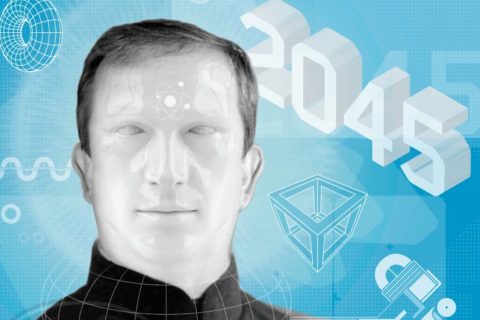Piet Hein van Dam
What grooks, geeks, one black swan and one octopus tell us about the future of our industry.
Black Swan
In 2007 Nicolas Taleb’s famous book “the Back Swan” was published. It is a must for every market researcher and free to download. In the aftermath of the book reviews an interesting discussion arouse. To whom should we attribute the quote that is the title of this article? A lot of people think it was the late baseball coach of the New York Yankees, Yogi Berra, said once that “it is hard to make predictions … especially about the future.” But no one ever heard him actually say that. Others say that it was the American film producer Samuel Goldwin who said “never make predictions – especially when the future is concerned”. Others think it came from the other side of the Atlantic. Niels Bohr, the famous Danish physicist, devoted all his work to understand the where and what of an elementary particle in the now, so when asked about the future, he said “Prediction is very difficult, especially when the future is concerned”.
Grooks
When ESOMAR asked me for a contribution on this special issue, they didn’t know how right they were. Neither was I. In my research to real origin of this quote I discovered – to my surprise – that Bohr said to be influenced by his friend, a Danish scientist and poet with the same name as I have: Piet Hein (1905-1996). That is what Taleb would call the highly improbable. During the Second World War Piet Hein was part of the Danish resistance and used the only weapon he had – his writing – to publish to called Grooks. These were poems whose contents were so hard to grasp that the censors allowed them to be published – not knowing their real meaning. His first one is the famous and moving Consolation Grook.
In the theory, a black swan, also called an outlier or rare event, is used to explain the
- Disproportionate role of high profile, hard-to-predict, and rare events that are beyond the realm of normal expectations.
- Non-computability of the probability of the consequential rare events using scientific methods
- Psychological biases that make people individually and collectively blind to uncertainty and unaware of the massive role of the rare event
Didn’t we always learn to discard and throw away the outliers in market research? So here is something new: if we want to say anything about the future, we need to look for weak signals, that we didn’t see before, whose potential effects are not computable and beyond the unexpected. Let’s go through a few and see if we can derive some learnings.
PhDs
Could you ever have imagined that a company that did not exist 5 years ago created a value that is higher than the total market capitalisation of Nielsen Inc, the largest MR firm on the planet? With only 55 employees? Against a vast 34.000 employees at Nielsen? In February 2014 this happened when Facebook took over Whatsapp. Outlier or not, the value paid per Whatsapp user as calculated by Statista shows that this was not an over the top acquisition. So what’s the lesson here, and what does it say about the future? My outtake is the following: you better have a few PhD’s working on designing your product than a lot of PhD’s working on delivering your product. In market research we still need to do a lot of intellectual work to process data, derive conclusions and produce a report. It is nice work, but hardly scalable. What happens if you put all your intellectual work in the design of the product? And use technology for operating and distributing it? First you need a lot of patience. Because you are going to make a lot of mistakes. And there will be little revenues, so you need to lower your income expectations. And then, after working on it for years, with a few dedicated people, eventually you may get a product as simple as and popular as Whatsapp or SurveyMonkey, or, an newcomer to our industry: Statwing. Statwing is an amazing – easy to use and easy to distribute – analysis tool, with built in statistics. The magic is that you don’t need a PhD to run the product because the PhD is in the product.
Geeks
Another weak signal that has manifested itself over the last decade is that more and more companies are created and run by geeks and nerds. We may think this is logical being in the age of digital transformation. But what is more interesting is to look at the why. Geeks have different intent: they want to create more than they want to compete. That may be why the software industry has about 3 times higher margins than the MR industry. Software is about adding something to make the existing (software-) ecosystem better. MR is being smarter than your competitor researcher. What’s more important is that geeks have important skills, like experimentation, failure recycling, patience and persistence. In the future nerds will run more and more parts of our industry. My guess is that the last domain that will give up it existing status is advertising. Or perhaps branding. The once so glamorous world of brand advertising now has to rely on cookie techniques to measure performance, which are unsuited to do the job. But since the Internet makes everything measurable, shouldn’t the effect of online branding campaigns be? A great example of how technology supports brands is Brandtone. The company uses smart coding and mobile technologies to create large databases of permissioned brand shoppers and they enable brands to engage with these consumers via their mobiles to achieve brand objectives. Check their video!
Doing the right thing
As a final thought, let’s look another recent outlier. Who would have imagined that a young entrepreneur, with estimated daily advertising revenues of $50.000 and only one employee on the payroll, would shut down his product overnight? It happened on February 8, 2014, when game developer Dong Nguyen announced on Twitter to kill his hugely popular game Flappy Bird. As a unexpected side effect, phones that still have the game installed have been claimed to be sold up to $90.000. In a fascinating interview in Forbes Nguyen explained that he quit the product because for users it had become addictive, instead of giving then some minutes of relaxation. It kept him awake and he decided to discontinue the product overnight. My expectation for the future is that ‘doing the right thing’ will become more and more important. Some people call it CSR, other call it good karma. In our industry, that will certainly revolve around the topic of online privacy in big data, as was also addressed in a recent article on the Wall Street Journal. In a 2013 Fast Forward article for ESOMAR’s Research World, I wrote more about this topic in relation to the MRS Fair Data initiative. Tim Berners-Lee, the inventor of the world wide web, believes an online “Magna Carta” to protect the independence of the medium and the rights of its users.
Octopus
You might think that I’m reducing the market research profession that that of Paul, the octopus that correctly predicted the outcome of many World Cup Matches on 2010. He could choose between two boxes of food, each representing one of the competing teams, and he “predicted” with a 100% success rate the matches that Germany played. Amazing. Statistically he only had a chance of 1 out of 128 to be right. Yet, may be Paul knew Gary Lineker, who said “Football is a simple game. Twenty-two men chase a ball for 90 minutes and at the end, the Germans always win”.
The answer is: I am not. What I’ve been doing in this paper is trying to learn from some interesting cases, some weak signals that we might have overlooked otherwise, to express what I think are the new rules that will influence our industry in the future. In the coming months, together with several co-authors I will publish a series of blogs on the implications of the new rules on methodology and data science.
Piet Hein van Dam (@pietheinvandam) is CEO of Wakoopa, Netherlands.


